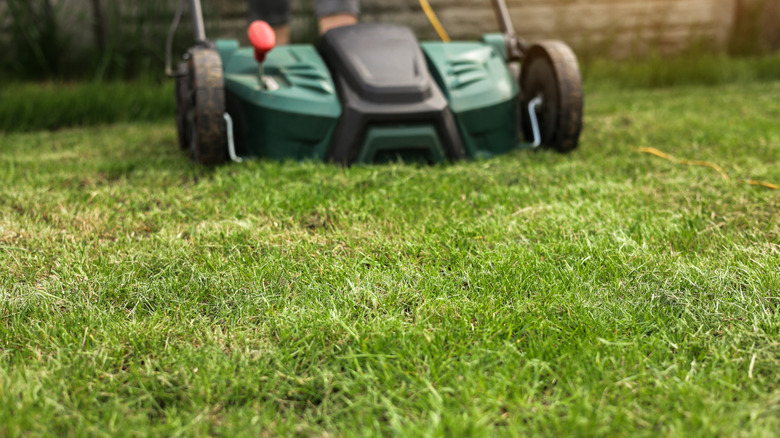Why You Should Think Twice Before Mowing Your Lawn In A Repeating Pattern Again
At a certain point, we all get into our own little groove when we're tidying up, and it is easy to turn our deep cleaning checklist into a habitual routine. Some of those habits we form, however, aren't always good ones, and this is especially true when it comes to mowing our lawns. For many homeowners, the monotonous chore of getting the grass trimmed can develop into a process of mowing in the same repetitive pattern — whether that's back and forth, or in a circular motion. While this may seem harmless and even efficient, it can actually have several negative impacts on your lawn's overall health.
It may come as a surprise, but issues such as soil compaction, rut formation, uneven cutting and flattened grass can result from mowing your lawn in the same pattern over and over again. Some of these issues — that build up slowly over time — are minor, and cause more short-term aesthetic problems like lack of uniformity or an overall unkempt look. However, there are a few more serious concerns that homeowners should be aware of if they want to keep their lawns lush and well-manicured all year long.
How repeated lawn-mowing patterns damage your grass
Of all the surprising ways you might be killing your grass without knowing it, soil compaction might be the biggest one. It is a major consequence of mowing in a repeated pattern, and since it's hidden beneath the surface, it's often happening without your knowledge. This problem occurs when soil particles are pressed together tightly, leaving little room for air, water, or nutrients to reach the grassroots. It happens when you pair repetitive movement along the same path with the weight of your lawnmower. The combination gradually compresses your soil and over time, can lead to poor drainage and pooling. It can also reduce your lawn's ability to absorb moisture and nutrients, resulting in a patchy and dry lawn that is much harder to maintain.
Rut formation is another issue that can occur from mowing in a repetitive pattern. Ruts are shallow, narrow depressions in the soil that form from the repetitive passage of the mower along the same path. Ruts create an uneven surface to your yard, which is often more visible when the grass is wet. Over time, they can become more pronounced and make your yard appear bumpy. If these formations become prominent enough, they can result in uneven cutting. Ruts are more likely to form if your lawn has drainage problems and is prone to waterlogged soil. All of this can be incredibly damaging to your lawn. So what do you do?
Fixing the issue and avoiding the problem
Avoiding issues from repetitive mowing patterns is pretty simple — just change up your mowing pattern regularly. By alternating the path and direction you take each time you cut your lawn, you allow your grass to grow differently and help prevent the above complications. You can do this by alternating between circular and diagonal patterns every few weeks. You might also consider mowing in different directions, such as alternating between horizontal and vertical cuts. There are multiple different patterns to choose from and switching it up will give your soil a chance to recover from the stress of repetitive mowing, keeping your lawn looking fresh and healthy.
If you think you may have already done damage to your lawn with repetitive mowing patterns, you can still address the problem. First assess how bad the damage is, and decide if professional help is needed. If the issue seems minor enough, there are a few quick fixes you can try on your own. To help fix soil compaction, use an aerator to puncture the ground and give the soil room to decompress. For shallow ruts, remove the grass from the center of the rut, fill it with soil until it is level with the surrounding lawn and replace the grass. Once you have the problem resolved, remember the best methods for mowing your lawn more efficiently and make sure to keep switching up your pattern.


